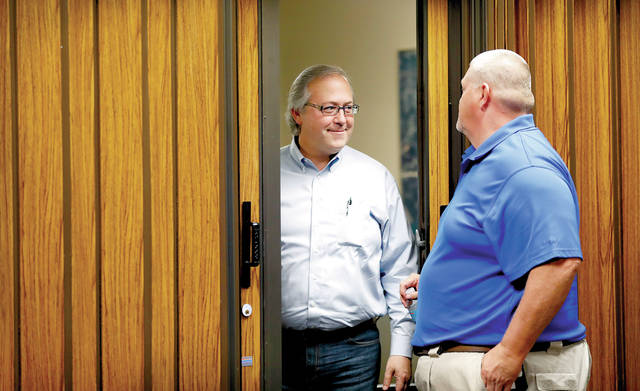CEDAR RAPIDS, Iowa — Democrats used a bus emblazoned with the words “Drive for our Lives” to gin up opposition to vulnerable House Republicans who voted against Obamacare with the aim of upending the GOP’s majority in next year’s midterm elections.
CEDAR RAPIDS, Iowa — Democrats used a bus emblazoned with the words “Drive for our Lives” to gin up opposition to vulnerable House Republicans who voted against Obamacare with the aim of upending the GOP’s majority in next year’s midterm elections.
The vote to repeal and replace the Obama health care law looms large for 21 GOP lawmakers, including Iowa Reps. David Young and Rod Blum. They represent competitive congressional districts where Democrat Hillary Clinton won or came close in last year’s presidential election.
The collapse of the yearslong Republican quest to dismantle Obamacare has been a bitter pill for House Republicans who voted for the legislation in May only to see the drive fall apart recently in the Senate when the GOP failed to muster enough votes.
Now all that some lawmakers have to show for the politically tough vote is the word “mean” — President Donald Trump’s description of legislation that would have made deep cuts in Medicaid, allowed states to opt out of coverage for essential benefits and knocked 23 million Americans off insurance.
The bus motored into Iowa on Friday, stopping in Cedar Rapids, the largest city in Blum’s eastern Iowa district.
The black-and-gray motor coach was parked in downtown Cedar Rapids as Diane Peterson urged Blum to listen to his district’s independent voters, who outnumber those affiliated with either major party.
“Of course there are things in the ACA that need fixing,” said Peterson, referring to the Obama health law’s name, the Affordable Care Act. The 61-year-old Democrat and coffee shop owner from Hiawatha added, “But Republicans now need to reach out.”
While Blum has allied himself with the House’s conservative Freedom Caucus, Young angered conservatives when he initially opposed a House GOP health care bill, then weeks later swung behind it. Independents were frustrated with the two-term congressman’s embrace of a partisan approach to repealing and replacing Obamacare.
“David Young is not as conservative as some would like here in southwest Iowa,” said Council Bluffs Republican David Overholtzer, a 56-year-old accountant.
“Things need to get done,” said Jeff Jorgensen, a western Iowa Republican county chairman. “He’s doing OK, but his chances for re-election are tied to Trump’s popularity.”
The Des Moines Register’s Iowa poll last month showed Trump’s disapproval climbing to 52 percent. The increase was driven largely by independents, 59 percent of whom disapproved of Trump’s job performance, compared to 50 percent in February.
Independents, who hold sway in Young’s politically diverse district, want a bipartisan approach to health care.
“That’s what I and others like me have been saying: Because of this fail, people might reach across the aisle and craft something together,” said Mark Scherer, a 65-year-old manufacturing representative and political independent from a north Des Moines suburb.
Now, Young is threading the needle, talking bipartisanship as he faces the reality that Democrats are gunning for him in a state where Trump’s approval is sinking and neither can boast a major legislative achievement.
“We’ve got to pivot for the good of the country to a more bipartisan solution,” the 49-year-old Young, a former chief of staff to Iowa Sen. Chuck Grassley, told The Associated Press during a visit to far western Iowa. “It’s probably an easier, clearer path.”
A national poll released Friday by the nonpartisan Kaiser Family Foundation found that around 4 in 5 want the Trump administration to take actions that help Obama’s law function properly, rather than trying to undermine it. Just 3 in 10 want Trump and Republicans to continue their drive to repeal and replace the statute.
Young defended his vote for the House GOP bill, arguing that Republicans added billions of dollars more to help people with preexisting conditions.
Democrat Janet Norris from Red Oak, who met privately with Young in her western Iowa hometown last week, called his reasoning “doublespeak.”
“You need to assure me you care about us in the Third District, and not what Republican leadership tells you to do,” she recalled telling Young during their private chat at the Red Oak fire station.
Norris doesn’t rule out voting next year for Young, who has drawn seven potential Democratic challengers, but cringed and said, “I just don’t feel like he’s independent enough.”
Young’s newly expressed, less-partisan view is music to the ears of Republican Christi Taylor, 46, a physician from Waukee in Des Moines’ burgeoning western suburbs, heavy with moderate Republicans and independents.
But she lamented Republicans’ attempt to quickly pass legislation with support from only GOP lawmakers. “This is not something any one party should ram through,” Taylor said, describing the House’s effort as “naive and arrogant.”
Democrat Bryce Smith from nearby Adel agrees with Young that the 2010 law needs tweaking, not shredding. The 26-year-old bowling alley owner complains that Young’s bipartisan tone is convenient, in light of the spectacular collapse of Republican efforts.
“All of a sudden, now that this failed, we need to approach it in a bipartisan way?” Smith said in disbelief. “If it would have passed the first time, we would have never heard from him that we need to work on a bipartisan solution.”


